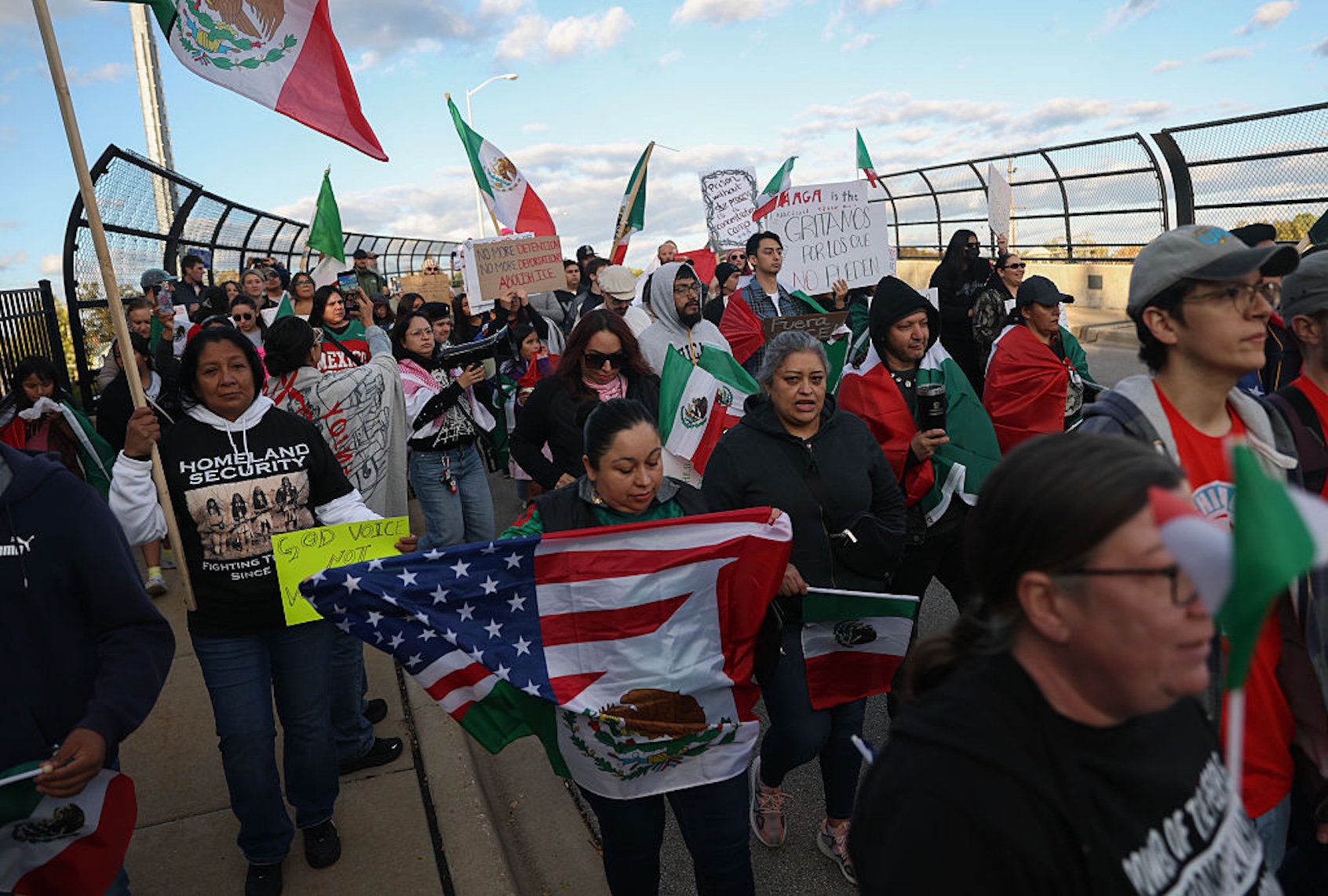Trump’s deportation raids ensnare Chicago’s everyday workers

The Age of Trump is like a novel with an infinite number of chapters and sequels. There have been wild successes, countless setbacks, and dramatic moments that have propelled the action forward. The American people are now in the part of the story where the government itself has become President Donald Trump’s weapon—a tool to punish his so-called enemies.
In this book, Trump is the narrator, the writer, the protagonist, the hero. And the plot, however shocking, follows a familiar script. The president’s shifting cast of antagonists is many. Right now, they include former FBI Director James Comey, New York Attorney General Letitia James, and former National Security Adviser John Bolton—all of whom are facing indictments on various allegations.
Senator Adam Schiff (D-Calif.) and other prominent Democrats and critics will likely follow, being accused of imaginary crimes simply for attempting to hold the president to account. There is also a longer list of de facto enemies that includes entire groups of people, institutions, organizations, and even ideas that Trump brands as “the poison” in “the blood” of the nation he has vowed to purge.
At the top are undocumented immigrants that Trump and his allies claim are “destroying the American republic… the American people and our social cohesion.” These individuals are not well-known; they are everyday people who have fallen on the wrong side of the “friends and enemies” distinction that animates Trumpism and its theater of cruelty.
Almost daily, in Democratic-led cities and parts of the country like Chicago, Trump’s mass deportation campaign produces harrowing scenes. At Chicago O’Hare International Airport, Border Patrol agents swarmed rideshare lots in search of “illegal aliens” and arrested 11 people. Food vendors are hiding, restaurants are losing money and are in danger of closing because their staff are afraid to go to work. Landscapers and other laborers are also being targeted. No place is safe.
Immigration and Customs Enforcement (ICE) agents are also violating schools, churches, courthouses, and other sanctuary zones in search of people who are not violent criminals or some great threat to society. They are working-class people who provide essential services to their neighbors and the larger community.
In Chicago alone, at least 1,000 people have been arrested or have otherwise de facto disappeared under what Trump has dubbed Operation Midway Blitz. The constitutional crisis that Democrats, the news media, pundits, and other public voices keep sounding the alarm about is not something in the future. It is here and now.
“We are in a fight for America. And make no mistake, there is no guarantee that we will win,” warned Craig Futterman, a law professor at the University of Chicago. “Absent a rebellion or inability to execute the law with regular forces, the President may not deploy the military against American citizens. But that is exactly what President Trump has done in cities like Los Angeles and Chicago.”
Our current moment is testing “who we are as a nation,” Futterman explained. “The Rule of Law, our fundamental rights, our fundamental freedoms are under assault: freedom of speech, press, and assembly; the meaning of equal protection under the law; our right not to be harassed, arrested, or beaten because of who we are, how we look, what we believe, or what we say.”
These events unfold in the shadow of Trump’s threats—and apparent plans—to invoke the Insurrection Act, declare martial law, issue executive orders and directives such as NSPM-7 (which is intended to silence dissent by usurping the First Amendment), and use the military and other forces to invade and occupy Chicago, Los Angeles, Portland, and other Democratic-led cities and blue parts of the country.
In an interview last week with POLITICO, Illinois Governor JB Pritzker warned that Trump’s threats of using the military against Chicago are a prelude to suspending the 2026 midterms and ending American democracy.
“I’m not afraid for me,” he said. “I’m afraid for the people of Illinois and the people of the United States with the attitude of this president. I think it’s not very far away from him offering and providing the military to protect polling places across America, but particularly in blue states and blue cities, with the idea that they could confiscate the ballot boxes if they think there is fraud in the election.”
Pritzker’s warning has already proved prescient. On Friday evening, the Trump administration announced plans for the Justice Department to monitor polling sites in the Democratic-led states of California and New Jersey in the run-up to the November 4 election. Requests for monitoring reportedly came from state GOP officials.
The president, as The New York Times reported, has also named election deniers to key positions in charge of elections, including Heather Honey, who worked with Trump attorney Cleta Mitchell to overturn the 2020 presidential election. Honey now serves as the Department of Homeland Security’s deputy assistant secretary for Election Integrity.
Trump has also threatened to have Pritzker and Chicago Mayor Brandon Johnson put in jail for not cooperating with his mass deportation offensive in the city.
The president’s threats, according to Paul Gowder, a constitutional law specialist and professor at Northwestern University Pritzker School of Law, “reveal both his strength and his weakness.”
“The legal standards for his use of troops rely on the premise that there is so much unrest that it is impossible to enforce the laws with normal personnel (or that there’s an outright rebellion, which is just laughable),” he said. “But there’s zero evidence that this is the case. The legal criteria for the use of troops simply do not apply, because he has ample federal civilian resources to enforce federal law, as he’s demonstrating every single day.”
Gowder, who is also an immigration expert, said Trump’s mass deportation campaign echoes America’s history of White-on-Black chattel slavery: “There’s a striking parallel here to the situation that transpired in the North after the Fugitive Slave Act of 1850, with the pouring of more and more resources into enforcing laws that the population opposes.”
There is widespread passive and peaceful resistance to ICE kidnappings in this city, for example, by private citizens who carry whistles to signal that they see ICE agents so their targets can hide, and of course, the ICEBlock app and the like.
For the average person, life in authoritarian states is mostly boring and mundane. But for those marked as enemies, their quotidian existence is one of anxiety, fear, and terror. They live under the weight of a question: “Am I next?”
However, those who believe they will be untouched by the regime—including its supporters, as well as apolitical people and those who are “just trying to keep their heads down”—are deluding themselves. Trouble, to paraphrase Nigerian author Chinua Achebe, will find them too. It will be carrying its own stool, sit down in their home, and refuse to leave.
Resistance in the face of such force is not futile. Futterman said he has found hope and strength in how everyday people are using their constitutional rights to push back against the Trump administration’s authoritarian power grab.
“As terrifying as it is,” he said, “I’m also proud to be living in Chicago in this time, where people have stood tall and proclaimed, ‘Not in our city.’ The federal incursion into Chicago does not represent the America that so many people have fought and died for. America is alive. I lack the language to describe the courage I have witnessed in the people of Chicago. Every day, I see ordinary people coming together and putting their bodies on the line to say, ‘I love America. This is not who we are.’”
https://www.salon.com/2025/10/26/trumps-deportation-raids-ensnare-chicagos-everyday-workers/








